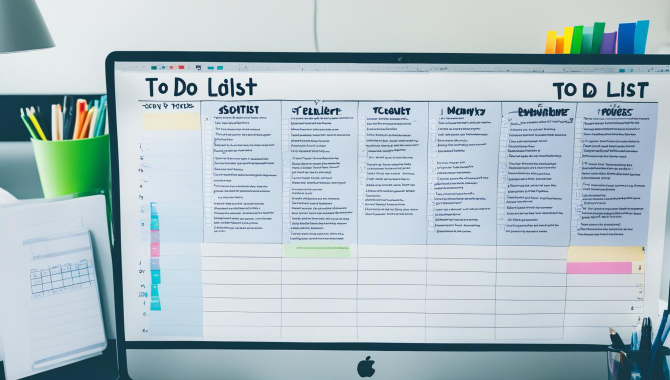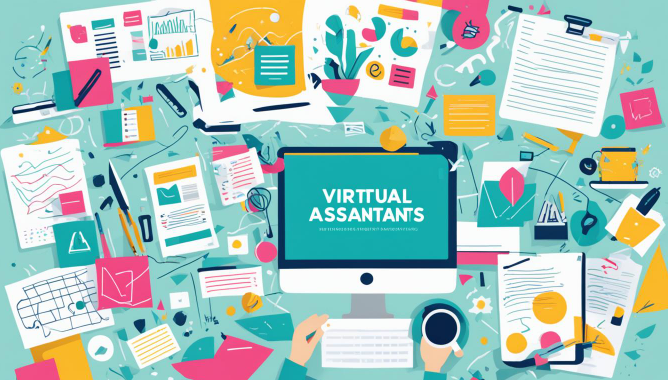Virtual assistants have many work tasks and personal duties to balance. It is important for them to manage time wisely. This guide will show them nine effective strategies to boost their efficiency.
One key method is time blocking. This means setting specific times for tasks, which cuts down on distractions and increases focus. Using project management tools can also help streamline work.
Having strict work hours and clear boundaries is important. It can lower stress and prevent burnout.
Creating to-do lists, setting up a work area, and taking breaks for self-care are valuable. They improve your remote work productivity. Time management apps like Time Doctor, Toggl Track, and Harvest make it easier to stay organized.
By using these tips, virtual assistants can manage their time better. They can enjoy a more work-life balance and help their clients succeed.
Introduction to Time Management for Virtual Assistants
Time management is key for virtual assistants. They juggle many tasks, from admin work to specialized services. By setting work hours well, organizing tasks, and using productivity apps, they work better and stay stress-free.
Importance of Effective Time Management
Using time wisely boosts how much you get done and cuts down stress. This lets virtual assistants make clients happy by meeting deadlines with great work. They can do this while keeping well by trying methods like the Pomodoro Technique, which mixes work and breaks well.
Challenges Faced by Virtual Assistants
Working from home brings its own set of hurdles, like distractions and different tasks. To beat these challenges, it’s important to talk clearly, set realistic deadlines, and update clients often. It also helps to have a good work spot. Here, AI chatbots can keep tasks on track, as they don’t get distracted. Learn more on how they, and other tools, can help with time management in this article about AI chatbots as virtual assistants
Virtual assistants need to use tech tools to work well, like project managing software and time trackers. These tools help in many ways, from setting tasks to checking their progress. When they plan time for each job, quality improves and they work faster.
Implementing Time Blocking Strategies
Time blocking helps break your day into blocks for work tasks. It makes your work day more organized. You can set aside focused time for each task and avoid distractions.
Definition and Benefits
This strategy lessens stress and boosts productivity. It cuts down on the stress caused by jumping between tasks. You work more efficiently, finishing things step by step.
Start by looking at how you spend your time now. Sort activities into high, low, and no importance. Then, group similar tasks in your time blocks. This boosts how much you get done and cuts down on distractions.
Setting Up Time Blocks
Begin by deciding what to work on and when. Use colors to mark your calendar for different tasks. This way, you can see everything clearly.
Make sure business tasks come first. Set some time aside at the end of each day to plan for the next. This helps things run smoothly.
Use tools like project software and time trackers to keep on top of things. Adjust your schedule as needed. Taking breaks keeps you fresh and focused all day long.
Creating and Prioritizing Task Lists
Task management is vital for virtual assistants to stay organized. Making good to-do lists gives them focus. It helps them and their managers see what’s being done.
How to Create Effective To-Do Lists
Good to-do lists act like maps for virtual assistants. First, they break big goals into smaller tasks. This makes work easier to tackle. They sort tasks into projects to keep on track.
They use time blocking to set times for tasks. This method boosts concentration. It also helps balance work and life better.
The Two-Minute Rule is another great tip. It says to do quick tasks now instead of later. The Pomodoro Technique suggests working hard for a short time, then taking a quick break. These ideas make work go smoother.
Prioritization Techniques
Choosing which task to do first is key for virtual assistants. Different strategies help them pick the right order. The Eisenhower Matrix helps see what’s most and least urgent. It’s a great way to organize tasks.
The ABC Method is simple and boosts focus. It says to do one thing at a time. The “One Thing” method focuses on the most important task. This advice helps them work smarter.
When tasks and goals are clear, it’s easier to be productive. These ways to prioritize are important for virtual assistants. They help make their to-do lists work better.
Having a Designated Workspace
A neat and quiet workspace is key for those working from home, like virtual assistants.
Importance of a Dedicated Office Space
Working in the same space every day can boost how much you get done. Research shows that people working from home are 57% more productive if they have a special area. This also helps you separate your job from your personal life, letting you concentrate better and work more efficiently.
Setting Up Your Home Office
A good home office setup reduces distractions and makes you feel more like a pro. Get furniture that’s comfy and good for your body, along with good lighting. Make sure to have fast internet and tools to block out noise. This kind of office, set up just for you, helps you focus and get more work done.
Utilizing Time Management Tools and Resources
Virtual assistants need to manage their time well to meet client needs. They should use tools to work more efficiently and stay organized. There are many apps and software they can use to make their tasks easier.
Top Time Management Tools
Time tracking tools are key for virtual assistants to keep on top of their tasks. Time Doctor, Toggl Track, and others let them track their time and show what they’ve done. These tools also give insights on how to be more productive.
Apps like Focus Booster and Rescuetime help virtual assistants focus. ProtopVA, a company that helps with outsourcing, says these tools are crucial. They help in working more efficiently and staying on task.
Software Recommendations
For managing projects, the right tools make a big difference. Basecamp is praised for making teamwork easy with its simple design. Doit.im is great for keeping tasks synced across different devices.
Using MeisterTask along with MindMeister helps with planning and organizing ideas. OneNote and Outlook work well together for managing tasks on the go. They offer easy access and efficient data management.
Todoist works on many platforms and helps teams stay on top of their work. Clockify provides free time tracking for all team sizes. By using these apps wisely, virtual assistants can be more organized and successful.
Making Self-Care a Priority
Virtual assistants are always busy with lots of tasks and different deadlines. To stay productive and motivated, they need to put self-care first.
Impact of Self-Care on Productivity
Self-care means taking care of your body and mind. It helps balance work and life well. When you take time for self-care, you can do better at work, feel less stressed, and avoid getting tired of your job.
Nearly all virtual assistants, 90%, who took time for self-care felt less stressed and did better at work. Setting clear work and personal life boundaries also helped. It made 25% of them happier with their jobs and 40% less likely to feel burnt out.
Self-Care Strategies for Virtual Assistants
Good self-care methods are exercise, sleep, and eating well. Keeping a steady sleep pattern and taking breaks can help you feel more energized and happier. Also, managing tasks based on your energy and liking helps with stress and time usage.
Finding activities that promote wellness is good too. Simple acts of kindness or hobbies not related to work can boost your mood. They do this by increasing feel-good chemicals in your brain, like serotonin and dopamine.
Sharing tasks with others and using technology wisely can also lighten your load. Delegation and tech use can make you 30% more productive. This was found in a survey at Medcube.
For virtual assistants, making self-care a habit is a must, not just something nice to do. Strategies like task prioritization and setting limits can keep you from burning out. They can also help you love your job more.
Setting and Maintaining Working Hours
It’s key for virtual assistants to have clear work hours. This keeps them productive and balances their life. With set hours, they can manage their time well, stay within work limits, and avoid getting too tired.
Establishing Boundaries
Virtual assistants must know their work limits for staying productive. If they don’t, they might overwork and feel too stressed. Tools like Toggl Track and RescueTime can show when they work best. This helps them plan their day, making sure they don’t take on too much.
Communicating Working Hours to Clients
Clear client communication is crucial for virtual assistants. They should let clients know when they are available. Keeping clients updated helps build trust and clear expectations. This way, everyone can work smoothly and respect each other’s time. It also stops sudden, urgent tasks and keeps the schedule on track.
Using a Journal or Thought Log
Keeping a journal or thought log is great for virtual assistants. It helps keep ideas organized. This way, they don’t lose valuable thoughts while handling their work.
Benefits of Keeping a Journal
Writing down ideas quickly is just one benefit. It also helps structure daily tasks. By doing this, virtual assistants work more efficiently and creatively. They stay focused, cutting down on distractions.
How to Maintain a Thought Log for Creativity
For creativity, virtual assistants should jot down ideas often. This keeps their thinking clear for upcoming work. Regular writing helps keep creative ideas alive. They can always go back to old thoughts, staying innovative and organized.
Learning to Say No
Diplomatically turning down requests is key for virtual assistants. This skill lets them manage their time well, making sure they don’t do too much and keep a good quality of work. It is important to say no sometimes to take care of themselves and their work.
Understanding the Importance of Saying No
Saying no is not just turning down requests; it’s about setting boundaries and being clear in what you can and cannot do. It’s vital to avoid taking on too much work, which can lead to being very tired and less effective. Virtual assistants often handle many tasks at once, so knowing what’s most important is critical.
Tools like the Eisenhower Matrix or the ABCD method can help decide what tasks to focus on. It’s also essential to regularly check your time management to see where you can improve. By using apps like Trello and Asana, it’s easier to keep track of deadlines and make sure the most important work gets done first.
Strategies to Decline Requests Politely
To say no politely, it’s important to be clear and offer other solutions. Giving different options or suggesting someone else who can help shows professionalism. Here are ways to do it:
- Provide Alternatives: Offer different times that might work best for you or suggest another expert for the job.
- Time Management by Refusal: Point out that focusing on your current tasks is key for doing a great job, not just doing more.
- Be Direct but Polite: Say something like, “I wish I could, but I have other important tasks right now. Let’s check back later.”
Being honest about what you can do is crucial. Keeping detailed client records and planning for unexpected events can help avoid too much stress. Good communication and turning down tasks wisely are important for being effective and keeping clients happy.
Conclusion
It’s vital for virtual assistants to learn time management strategies. These skills help them work better. They become more productive and efficient by using methods like time blocking.
Having a clear work area is key too. Also, using tools for time management makes a big difference. This includes software that helps them work with others easily.
Working on self-care and setting regular working times is also important. Effective journaling and knowing when to say no help too. These things make up essential steps to being a great virtual assistant.
With these strategies, virtual assistants can do their best work. They can meet their clients’ needs and still balance their life. Going this route brings success and happiness in their job.
FAQ
Why is effective time management important for virtual assistants?
Good time management helps virtual assistants juggle tasks and meet deadlines. It also lets them keep a healthy life-work balance. This way, they work more efficiently, reduce stress, and serve their clients better.
What challenges do virtual assistants face when managing their workload?
Working from home, virtual assistants deal with many distractions. They also handle tasks for several clients at once. Finding a balance between work and personal life is hard but crucial for staying productive.
What is time blocking, and how does it benefit virtual assistants?
Time blocking is about setting aside certain times for specific tasks. It organizes their workdays, reduces distractions, and boosts focus. This makes virtual assistants more effective in their jobs.
How can virtual assistants set up effective time blocks?
They should set aside different days or times for different tasks. For instance, they might keep mornings for talking to clients and afternoons for projects. This method helps them finish tasks on schedule.
How can virtual assistants create effective to-do lists?
They can make great to-do lists by breaking big goals into small tasks. They should then rank these tasks by importance and use tools like the Eisenhower Matrix. Also, the Pomodoro Technique can help with staying focused during work.
Why is having a designated workspace important?
A specific work area is key for virtual assistants. It helps them maintain a professional atmosphere and avoid distractions. This separation improves their focus and increases productivity.
What are some recommended time management tools for virtual assistants?
Time Doctor, Toggl Track, Harvest, and Clockify are excellent for managing time. They help with tracking time, handling projects, and keeping in touch with clients smoothly.
How does self-care impact productivity?
Taking care of oneself is crucial for staying productive. This includes exercising, eating well, sleeping enough, and having personal time. These habits help prevent burnout and keep the mind sharp for work.
How can virtual assistants establish and maintain working hours?
They can set regular hours for work and personal activities. It’s important to let clients know about these hours. This strategy helps avoid working too much and manages client expectations well.
What are the benefits of keeping a journal or thought log?
Writing down thoughts and ideas can help virtual assistants stay organized. It makes sure they don’t forget any important insights. This way, they can focus better on their current work and save ideas for later projects.
Why is it important for virtual assistants to learn to say no?
Saying no helps virtual assistants focus on what’s most important. It allows them to control their workload and use their time wisely. Politely refusing tasks can keep them from feeling overwhelmed.
What strategies can virtual assistants use to decline requests politely?
They could propose different ways to help, such as suggesting other timeframes. This method shows they’re willing to support others within their means. It maintains good relationships based on clear expectations.

More Posts
8 Benefits of Using Productivity Planner
If you’re looking for a productivity planner app, there are a lot of options out there. Tons of different features and services make each calendar different from the rest. This article will look...
17 Proven Time Management Tips for Busy Moms
Are you a mom? Congratulations! That automatically makes you a superhero! Though the cape you wear is invisible, we see and appreciate you, busy mom. You step up, get things done, and stay...
7 Best Digital Planner Apps for iPad
The digital revolution has reimagined the way we plan and organize our lives. Traditional paper planners have given way to digital planning apps that offer convenience, ease, and a range of features that...
Productivity Tips for Creative Professionals
Many creative people have lots of tasks, and we need to download productivity tips for creative pros for that. They work on production, marketing, and finances. It’s hard to keep the creative flow...



